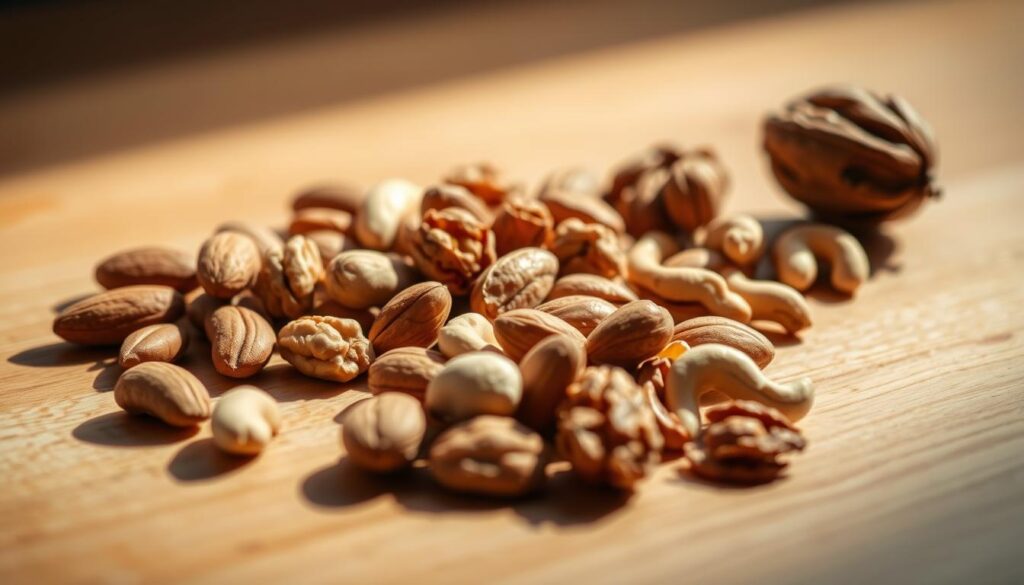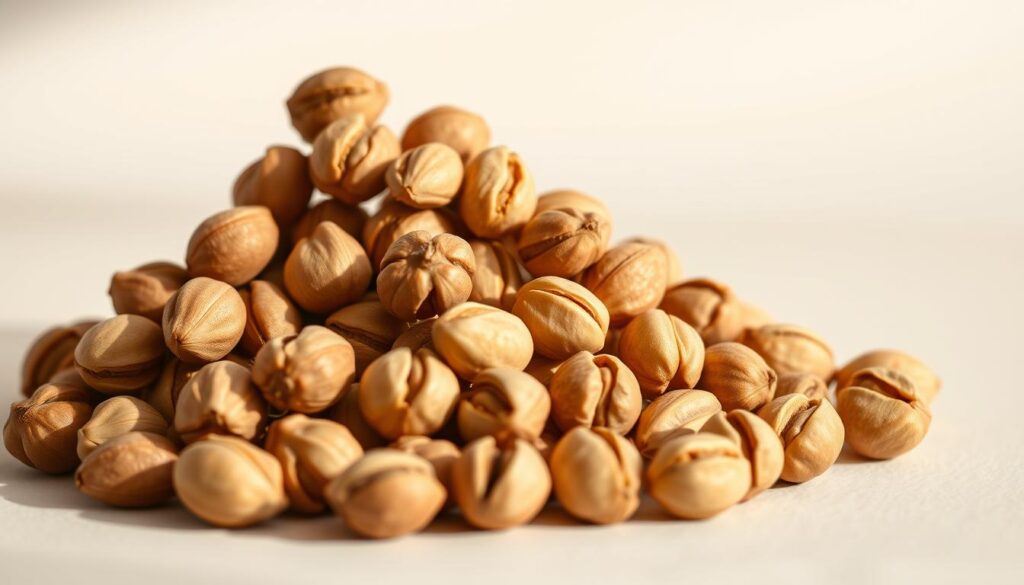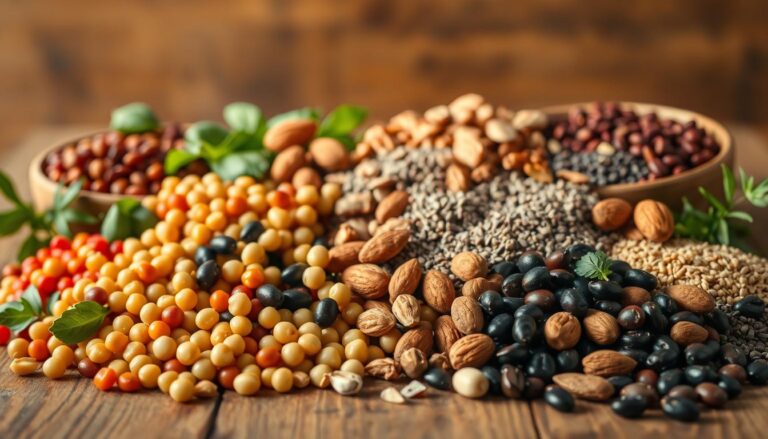Nuts have become a staple in many diets due to their potential health benefits and role in disease prevention.
Eating nuts regularly has been associated with various health outcomes, from heart health to weight management. But what makes nuts so special? They are rich in heart healthy fats, vitamins, minerals, and antioxidants, making them a nutritious choice.
As we explore the health benefits of consuming nuts, we will examine the scientific evidence behind these claims and discuss how different varieties of nuts contribute to various health outcomes.
Key Takeaways
- Nuts are rich in heart-healthy fats, vitamins, minerals, and antioxidants.
- Regular consumption of nuts is associated with improved heart health.
- Nuts can play a role in weight management.
- Different varieties of nuts have unique nutritional profiles.
- Incorporating nuts into a balanced diet can have numerous health benefits.
The Nutritional Powerhouse What’s in Your Handful of Nuts?
Nuts are not just tasty they’re also packed with nutrients that are essential for optimal health.
A handful of nuts provides a mix of protein, healthy fats, and fiber, making them a satisfying snack that can help curb hunger and support overall nutrition.
Protein, Healthy Fats, and Fiber Content
Nuts are a good source of protein, with some, like almonds, offering about 6 grams per ounce. They are also rich in healthy fats, primarily monounsaturated and polyunsaturated fats, which can help lower bad cholesterol levels. Additionally, nuts are a good source of fiber, which can aid in digestion and satiety.
Essential Vitamins and Minerals
Nuts are a rich source of various vitamins and minerals. For instance, Brazil nuts are exceptionally high in selenium, with just one nut providing more than 100% of the Reference Daily Intake RDI.
Other nuts are rich in vitamin E like almonds, magnesium, and phosphorus, contributing to various bodily functions, including immune function, bone health, and energy metabolism.
The Effects of Eating a Handful of Nuts Every Day on Heart Health
Research has revealed that regular nut consumption can lower the risk of heart disease. Eating a handful of nuts daily has been shown to have a positive impact on various aspects of heart health.
How Nuts Lower Bad LDL Cholesterol
Nuts, particularly walnuts and pistachios, are rich in unsaturated fats that help lower bad LDL cholesterol. Studies have found that regular consumption of these nuts can lead to a reduction in total cholesterol levels, thereby reducing the risk of heart disease.

Impact on Good HDL Cholesterol Levels
Eating nuts like hazelnuts, pistachios, and walnuts may help raise good HDL cholesterol levels. As stated by experts, a 3.75mg/dL reduction in total cholesterol level can lower heart disease risk. Regular nut consumption can positively influence HDL cholesterol levels, which help remove LDL cholesterol from the bloodstream.
You may like to read: Prostate Cancer Key Facts for Men
Nuts and Longevity Can They Help You Live Longer?
Emerging research suggests that incorporating nuts into one’s diet may contribute to a longer life. Studies have shown that the consumption of nuts is associated with various health benefits, including reduced risk of certain diseases.
Research on Nut Consumption and Mortality Rates
Research indicates that individuals who consume a handful of nuts daily have a lower risk of mortality compared to those who consume fewer nuts. Specifically, a study found that participants who ate a handful of nuts or more daily had a 15 percent lower risk of developing cancer.
Why Nuts Contribute to a Longer Life
The health benefits of nuts can be attributed to their high levels of antioxidants, fiber, and healthy fats. These components work together to improve heart health reduce the risk of certain diseases, and promote overall well-being, ultimately contributing to a longer lifespan.
Weight Management Benefits Debunking the High Calorie Myth
The notion that nuts are too calorie-dense to be included in a weight management plan is a misconception. While it’s true that nuts are relatively high in calories, their overall impact on weight management is more complex.
How Nuts Can Aid Weight Loss Despite Their Calorie Content
Nuts can aid weight loss due to their unique composition of protein, fiber, and healthy fats which together increase feelings of fullness and reduce hunger.
As stated by a study increasing fiber intake from 18 to 36 grams daily may result in up to 130 fewer calories absorbed. This satiety effect can lead to a reduction in overall calorie intake, supporting weight loss efforts.

The Satiety Factor Why Nuts Keep You Fuller Longer
The protein and fiber in nuts play a crucial role in enhancing satiety. When you eat nuts as a snack they can lead to a reduction in subsequent food intake. This is because the combination of protein fiber, and healthy fats in nuts helps to regulate appetite hormones, keeping you fuller for longer.
Nuts as Powerful Antioxidants
Nuts are rich in antioxidants, which play a crucial role in protecting our cells from damage caused by free radicals and oxidative stress. This makes them a valuable addition to a healthy diet.
Fighting Free Radicals and Oxidative Stress
The antioxidant properties of nuts help combat free radicals, which are unstable molecules that can cause cellular damage.
The antioxidant capacity of nuts is comparable to that of other antioxidant rich foods like fruits and vegetables.
Nuts like almonds and walnuts are particularly effective in fighting oxidative stress.
Which Nuts Have the Highest Antioxidant Content
Some nuts stand out for their high antioxidant content. For instance, almonds are rich in tocopherol a form of vitamin E that is associated with lower inflammation and cancer risk.
Walnuts have a greater capacity to fight free radicals than fish while pine nuts have high levels of phytosterols. Incorporating a variety of nuts into your diet can provide a broad range of antioxidant benefits.
To maximize the antioxidant benefits of nuts, it’s essential to choose raw or dry-roasted nuts and store them properly to preserve their antioxidant content.
Blood Sugar Regulation and Diabetes Prevention
Nuts are a valuable addition to the diet of people looking to regulate their blood sugar levels. A 12-week controlled study found that people with metabolic syndrome who consumed just under 1 ounce, 25 grams of pistachios twice per day experienced a 9% decrease in fasting blood sugar, on average.
How Nuts Help Stabilize Blood Sugar Levels
Nuts help stabilize blood sugar levels due to their nutrient profile, which includes healthy fats, protein, and fiber. These components work together to slow down the absorption of sugar into the bloodstream, preventing sudden spikes in blood sugar levels.
Benefits for People with Prediabetes and Type 2 Diabetes
For people with prediabetes and type 2 diabetes, incorporating nuts into their diet can be particularly beneficial. Research has shown that regular nut consumption can improve insulin sensitivity and reduce the risk of complications associated with diabetes, such as heart disease.
A study on pistachios found that they not only decreased fasting blood sugar but also reduced blood pressure and C-reactive protein CRP a marker of inflammation.
Anti Inflammatory Properties of Daily Nut Consumption
A handful of nuts a day may be a simple way to combat chronic inflammation. Certain nuts, including pistachios Brazil nuts, walnuts, and almonds have been found to fight inflammation in both healthy individuals and those with serious conditions like disease risk factors associated with diabetes and kidney disease.
The anti-inflammatory effects of nuts can be attributed to their rich nutritional profile. For instance Brazil nuts are known for their high selenium content, which contributes to their health benefits.
Reducing Inflammatory Markers in the Body
Research has shown that consuming nuts can lead to a reduction in inflammatory markers in the body. A key factor is the presence of omega-3 fatty acids in certain nuts, particularly walnuts, which are known to contribute to their anti-inflammatory effects.
| Nut Type | Anti-Inflammatory Properties | Key Components |
|---|---|---|
| Walnuts | High | Omega-3 fatty acids |
| Brazil Nuts | High | Selenium |
| Pistachios | Moderate | Antioxidants |
Benefits for Chronic Inflammatory Conditions
The anti-inflammatory properties of nuts can benefit people with chronic inflammatory conditions such as arthritis, inflammatory bowel disease, and autoimmune disorders. Incorporating a variety of nuts into their diet can be a useful part of an anti-inflammatory eating pattern.
You may like to read: Gut Healthy and Sustainable Eating Guide
Potential Downsides of Eating Too Many Nuts

While nuts are a nutritious snack, overconsumption can lead to certain health issues. It is essential to be aware of the potential risks associated with eating too many nuts.
Sodium Content in Roasted and Flavored Varieties
Roasted and flavored nuts can be high in sodium, which may be a concern for people with high blood pressure or other heart health issues. Consuming excessive sodium can lead to cardiovascular problems. It is recommended to opt for unsalted or low-sodium nuts to minimize this risk.
Selenium Toxicity Risk with Brazil Nuts
Brazil nuts are rich in selenium, with just one or two nuts meeting the daily recommended intake. However overeating Brazil nuts can lead to selenium toxicity causing symptoms like fatigue weakness, and burning sensations. It is crucial to consume Brazil nuts in moderation to avoid this risk to your health when eating a nut as a snack.
The Optimal Daily Serving: How Many Nuts Should You Eat?
While nuts are nutritious their high calorie density means that the optimal daily serving size is a crucial consideration. Eating a variety of nuts is recommended as each type offers different amounts and types of nutrients.
Recommended Portion Sizes for Different Nuts
A general guideline is to consume a small handful of nuts, which is about 1 ounce or 28 grams. For specific nuts like Brazil nuts it’s best to enjoy them in smaller portions due to their high selenium content. The recommended daily serving can vary depending on the type of nut and individual nutritional needs.
Balancing Nuts in Your Overall Diet
Nuts can fit into various dietary patterns, including Mediterranean, vegetarian, keto, and paleo approaches.
To balance nuts in your diet consider them as a complement to other food groups, and be mindful of overall calorie intake. For a healthy diet, it’s essential to balance nut consumption with other sources of healthy fats, like seeds and avocados, to maintain dietary balance and support overall health.
Comparing Different Types of Nuts and Their Unique Benefits
While many nuts offer health benefits, some stand out for their unique nutritional profiles and potential health advantages. A diverse range of nuts can provide a broad spectrum of nutrients and health benefits.
Almonds Walnuts and Pistachios The Heart Healthy Trio
Almonds, walnuts, and pistachios are known for their heart-healthy properties. They are rich in unsaturated fats, which can help lower bad LDL cholesterol and improve overall heart health.
Brazil Nuts Cashews, and Pecans Special Properties
Brazil nuts are exceptionally rich in selenium, a mineral that acts as an antioxidant. Cashews are high in magnesium which is crucial for bone health. Pecans are rich in antioxidants and have been shown to improve heart health.
Hazelnuts Macadamias, and Pine Nuts Underrated Nutritional Stars
Hazelnuts are high in vitamin E, which is beneficial for skin health. Macadamias are rich in monounsaturated fats, contributing to their health benefits. Pine nuts contain pinolenic acid, which may help regulate appetite.
Conclusion Incorporating a Handful of Nuts into Your Daily Routine
Making nuts a part of your daily diet can lead to substantial health improvements. If you’re not allergic, you can enjoy a small handful of unsalted or salted nuts every day.
Eating nuts in moderation can offer numerous benefits from heart health to weight management. To eat nuts effectively, choose fresh ones and incorporate them into your meals and snacks. A nut-rich diet can be a simple and delicious way to boost your overall health.
You may like to read: How to Lose 5kg in 7 Days A Simple Diet Plan.





